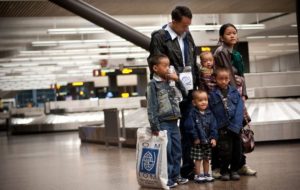Refugee resettlement places harder to find – UN
 Less than 5 per cent of refugees needing resettlement found new homes in 2018 despite record levels of worldwide forced human displacement, new figures from the UNHCR show.
Less than 5 per cent of refugees needing resettlement found new homes in 2018 despite record levels of worldwide forced human displacement, new figures from the UNHCR show.
The data shows just 4.7 per cent of global refugee resettlement needs were met last year under UNHCR-facilitated resettlement departures.
It shows that of the estimated 1.2 million UNHCR-registered refugees in need of immediate resettlement in 2018, only 55,692 were actually resettled.
The largest number of resettlement departures were from major refugee-hosting countries, including Lebanon (9,800), followed by Turkey (9,000), Jordan (5,100) and Uganda (4,000).
Out of a total of 81,310 referrals, the largest number of referred refugees are from the Syrian Arab Republic (28,200), the Democratic Republic of the Congo (21,800), Eritrea (4,300) and Afghanistan (4,000).
Sixty-eight per cent of submissions last year were from survivors of violence and torture, those with legal and physical protection needs, and women and girls at risk. More than half, 52 per cent, of all resettlement submissions in 2018 were for children.
Resettlement, which involves the relocation of refugees from a country of asylum to a country that has agreed to admit them and grant them permanent settlement, is available only to a fraction of the world’s refugees.
Typically, less than one per cent of the 19.9 million refugees worldwide under UNHCR’s mandate are ever resettled.
The UNHCR says resettlement is largely a life-saving tool to ensure the protection of people most at risk.
Resettlement and other complementary pathways for admission, is a key objective of the Global Compact on Refugees, to help reduce the impact of large refugee situations on host countries.
In 2019, it is estimated that 1.4 million refugees who are currently residing in 65 refugee hosting countries worldwide, will need resettlement.
Major resettlement needs this year include those for Syrian refugees currently hosted in countries across the Middle East and Turkey (43 per cent) and for refugees in countries of asylum and transit along the Central Mediterranean Route (22 per cent), where movements towards Europe continue to take a devastating toll on human life.
The United States took in 17,113 resettled refugees through her UNHCR channel in 2018, leading 27 countries who resettled a total of 55,692 refugees.
But that was down from Washington’s acceptance of 24,559 resettled refugees in 2017, President Trump’s first year in office, and 78,761 in 2016, the last full year of the Obama administration, UNHCR figures show.
The overall total of resettled refugees last year was 10,000 fewer than in 2017 and less than half of the 126,291 in 2016.
Canada was the second highest receiving country for UNHCR channel refugees last year with 7,713 resettled refugees, followed by Britain (5,702), France (5,109) and Sweden (4,861).
Australia took just over 3,000 refugees through the UNHCR channel but almost another 15,000 refugees came through complimentary channels.
“Despite record levels of worldwide forced displacement, just 4.7 per cent of global refugee resettlement needs were met in 2018,” a UNHCR statement said.
Syrian refugees living in countries across the Middle East and Turkey accounted for 28,174, or more than one-third of the total 81,310 refugees referred by UNHCR to resettlement countries last year for consideration, the statement said.
Refugees from the Democratic Republic of Congo, Eritrea and Afghanistan followed, many of them having fled violence and torture.
Laurie Nowell
AMES Australia Senior Journalist












